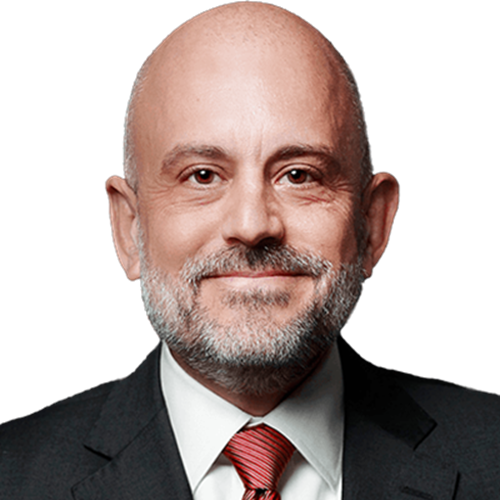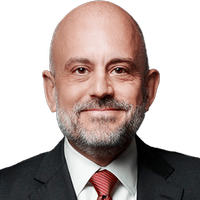In Financial Planning, Consider Your ‘Fuel Tank of Capability’
Trying to do too much at the same time can actually thwart your financial planning efforts. Delegating to a professional can free you up to expend your energy on something you love.

Profit and prosper with the best of Kiplinger's advice on investing, taxes, retirement, personal finance and much more. Delivered daily. Enter your email in the box and click Sign Me Up.
You are now subscribed
Your newsletter sign-up was successful
Want to add more newsletters?

Delivered daily
Kiplinger Today
Profit and prosper with the best of Kiplinger's advice on investing, taxes, retirement, personal finance and much more delivered daily. Smart money moves start here.

Sent five days a week
Kiplinger A Step Ahead
Get practical help to make better financial decisions in your everyday life, from spending to savings on top deals.

Delivered daily
Kiplinger Closing Bell
Get today's biggest financial and investing headlines delivered to your inbox every day the U.S. stock market is open.

Sent twice a week
Kiplinger Adviser Intel
Financial pros across the country share best practices and fresh tactics to preserve and grow your wealth.

Delivered weekly
Kiplinger Tax Tips
Trim your federal and state tax bills with practical tax-planning and tax-cutting strategies.

Sent twice a week
Kiplinger Retirement Tips
Your twice-a-week guide to planning and enjoying a financially secure and richly rewarding retirement

Sent bimonthly.
Kiplinger Adviser Angle
Insights for advisers, wealth managers and other financial professionals.

Sent twice a week
Kiplinger Investing Weekly
Your twice-a-week roundup of promising stocks, funds, companies and industries you should consider, ones you should avoid, and why.

Sent weekly for six weeks
Kiplinger Invest for Retirement
Your step-by-step six-part series on how to invest for retirement, from devising a successful strategy to exactly which investments to choose.
One of the hardest lessons I’ve ever had to learn is that we, as human beings, can only do “so much.” This is a lesson that applies to every aspect of life, really, including financial planning.
Physically, we can only do “so much” before we need to rest and recharge.
Mentally, we can only take on “so much” before we become overwhelmed.
From just $107.88 $24.99 for Kiplinger Personal Finance
Become a smarter, better informed investor. Subscribe from just $107.88 $24.99, plus get up to 4 Special Issues

Sign up for Kiplinger’s Free Newsletters
Profit and prosper with the best of expert advice on investing, taxes, retirement, personal finance and more - straight to your e-mail.
Profit and prosper with the best of expert advice - straight to your e-mail.
Practically, we can only do “so much” with the time, talent and treasure we possess.
Just like a vehicle has a literal fuel tank that will take you so far before you need to refuel, we all have our own “fuel tank of capability.” How much you can do and how far you can go is entirely dependent on the capacity of that tank.
Of course, we wouldn’t be talking about this at all if it didn’t also apply to our finances.
One of the most common missteps people make with their personal finances is trying to do too much with their resources. For example, here is a list of one client’s financial goals:
- Pay down debt.
- Save for kids’ college.
- Save for retirement.
- Pay off mortgage.
- Cash flow to fund home improvements.
- Pay cash for vehicles.
While these are all great goals, it’s not practical to try to accomplish all of this at the same time. Most folks just don’t have enough resources in their “fuel tank” to take it all on. It is not only difficult to stretch adequate resources across so many tasks at once, but some of these goals actually work against one another!
I often see people segregate their financial goals into silos, overlooking possible opportunities that exist by using a more strategic approach. There are many possible reasons for this method of oversimplification, but what I know to be true through my years of experience is that people will inherently gravitate toward what’s easy over what is often best.
For instance, the idea of paying off a mortgage seems reasonable with all the interest saved on a mortgage, but what is often overlooked is the opportunity cost of accelerating the mortgage. The money needed to accelerate the mortgage could be invested over time to create a more favorable result, considering the home will appreciate regardless of whether you have a mortgage.
And if you’re using your extra resources to accelerate a mortgage, how will you pay for home repairs? Kids’ college? New vehicles? You guessed it — the bank often fills the money gap, and payments are made on debts outside of the mortgage payments, so the problem gets compounded.
Realizing the Opportunity Cost
Perhaps even more important, it’s impossible to accomplish all of these goals AND build and grow wealth. If you truly want to maximize your capabilities, the focus should be on building resources and then creating cash flow from those resources to fund these other things.
Remember: Once you spend money, it’s gone forever.
In other words, the opportunity cost of money spent is the loss of a potential income stream. People can make large amounts of money, but if they spend it — even by paying down debt — they will continue to have to create new income to replace it.
When you break this down to the most important aspect of your entire financial picture, you find that how much passive income you have should be the highest-priority goal. The reason this should be your biggest priority is because it is what frees you from having to trade your time for money.
If you work for a living, you do your job in exchange for a paycheck. The cash flow from that paycheck supports your lifestyle. Beyond the paycheck, the time you are trading is the most precious resource, not the money. Your time is irreplaceable. It is in limited supply. So, why not reverse the system and figure out a method for trading your money for time?
This is where passive income comes in — it fills your income gap, allowing you to free up your time. If people would focus on building cash flow, they could have an ongoing passive income stream that offers them time freedom.
In my experience, I find that people get caught up in their silos and find themselves beholden to their system of working to spend. The truth is that people can live without saving money, and they can live with debt, but they cannot live without cash flow.
The (Even) Bigger Picture
Financial planning aside, there are even more factors to consider when it comes to determining how you’ll use the resources you have available to you. Ask yourself: What is the most important metric to track when it comes to wealth and happiness? In other words, how do you know if you're winning?
When people are measuring how happy and successful they are, the list of priorities almost always includes more than just finances. In fact, most people’s list of priorities looks something like this:
- Family
- Friends
- Faith
- Fitness
- Free time
- Finances
And, while we all have access to varying amounts of cash, we all have a finite amount of time to achieve our goals. In an average 24-hour day, 30-day month and 365-day year, how much do you want to allocate for each of these areas? What will it take to make you happy and successful in your relationships, your faith, your health and your life?
Once you figure this out, you have two options.
Option #1: Do It All Yourself.
If spending hours researching, implementing and learning everything about how to improve your relationships, health and finances by trial and error sounds like fun, this is the option for you.
Just be careful: Doing it wrong may cost you more than you’ll save by doing it yourself. While you may excel at one subject or another, it’s pretty unlikely that you would ever be as knowledgeable as a counselor, pastor, doctor AND financial professional.
Furthermore, within each of these areas of expertise, there are a variety of different philosophies, strategies and tactics you could use. Without the appropriate education, training and experience, it will be difficult (if not impossible) to know which is the best for you. This is especially true when you consider the fact that absolutely none of the advice you’ll read, Google or hear from friends will be tailored to your unique situation. From preventing disease to building a portfolio, that’s a big risk.
Option #2: Delegate, Delegate, Delegate.
In Stephen Covey’s book The 7 Habits of Highly Effective People, he explains that the happiest and most successful people have figured out how to “buy” more time by relying on professionals with the knowledge and experience to help them manage their relationships, health, time and money.
It’s simple when you think about it. Wouldn’t you rather spend $1,000 to pay a lawyer to create your will, draft your power of attorney and set up your trust than spend 100 hours doing it yourself? Even if you could complete the tasks for $0, which is highly unlikely, isn’t your time worth more than $10 per hour? Plus, wouldn’t you rather spend those 100 hours on your family, your hobby or your health?
The people who answer “yes” to that question understand that paying a professional is an investment (rather than an expense) that allows them to spend more time doing what they feel passionate about with the people they love.
In Tom Rath’s book StrengthsFinder 2.0, he explains that successful people tend to leverage strengths and delegate weaknesses. They spend their time on the things they are good at and want to spend their time on, and they delegate the tasks they can gain more time from NOT doing.
When it comes to important financial matters, having a multifamily office is a way to delegate the heavy lifting of financial planning away from yourself. By having a team of professionals navigating the financial complexities of life, you free yourself from having to spend valuable time doing things that someone else could possibly do faster and more effectively. Delegation frees your time and allows you to spend it doing things you enjoy.
To learn whether a multifamily office is right for you, take this quiz.
Securities offered only by duly registered individuals through Madison Avenue Securities, LLC. (MAS), Member FINRA &SIPC. Advisory services offered only by duly registered individuals through Skrobonja Wealth Management (SWM), a registered investment advisor. Advisory services are only offered to clients or prospective clients where SWM and its representatives are properly licensed or exempt from licensure. SWM is not affiliated with MAS.
Profit and prosper with the best of Kiplinger's advice on investing, taxes, retirement, personal finance and much more. Delivered daily. Enter your email in the box and click Sign Me Up.

Brian Skrobonja is a Chartered Financial Consultant (ChFC®) and Certified Private Wealth Advisor (CPWA®), as well as an author, blogger, podcaster and speaker. He is the founder and president of a St. Louis, Mo.-based wealth management firm. His goal is to help his audience discover the root of their beliefs about money and challenge them to think differently to reach their goals. Brian is the author of three books, and his Common Sense podcast was named one of the Top 10 podcasts by Forbes. In 2017, 2019, 2020, 2021 and 2022, Brian was awarded Best Wealth Manager. In 2021, he received Best in Business and the Future 50 in 2018 from St. Louis Small Business.
-
 Dow Adds 1,206 Points to Top 50,000: Stock Market Today
Dow Adds 1,206 Points to Top 50,000: Stock Market TodayThe S&P 500 and Nasdaq also had strong finishes to a volatile week, with beaten-down tech stocks outperforming.
-
 Ask the Tax Editor: Federal Income Tax Deductions
Ask the Tax Editor: Federal Income Tax DeductionsAsk the Editor In this week's Ask the Editor Q&A, Joy Taylor answers questions on federal income tax deductions
-
 States With No-Fault Car Insurance Laws (and How No-Fault Car Insurance Works)
States With No-Fault Car Insurance Laws (and How No-Fault Car Insurance Works)A breakdown of the confusing rules around no-fault car insurance in every state where it exists.
-
 For the 2% Club, the Guardrails Approach and the 4% Rule Do Not Work: Here's What Works Instead
For the 2% Club, the Guardrails Approach and the 4% Rule Do Not Work: Here's What Works InsteadFor retirees with a pension, traditional withdrawal rules could be too restrictive. You need a tailored income plan that is much more flexible and realistic.
-
 Retiring Next Year? Now Is the Time to Start Designing What Your Retirement Will Look Like
Retiring Next Year? Now Is the Time to Start Designing What Your Retirement Will Look LikeThis is when you should be shifting your focus from growing your portfolio to designing an income and tax strategy that aligns your resources with your purpose.
-
 I'm a Financial Planner: This Layered Approach for Your Retirement Money Can Help Lower Your Stress
I'm a Financial Planner: This Layered Approach for Your Retirement Money Can Help Lower Your StressTo be confident about retirement, consider building a safety net by dividing assets into distinct layers and establishing a regular review process. Here's how.
-
 The 4 Estate Planning Documents Every High-Net-Worth Family Needs (Not Just a Will)
The 4 Estate Planning Documents Every High-Net-Worth Family Needs (Not Just a Will)The key to successful estate planning for HNW families isn't just drafting these four documents, but ensuring they're current and immediately accessible.
-
 Love and Legacy: What Couples Rarely Talk About (But Should)
Love and Legacy: What Couples Rarely Talk About (But Should)Couples who talk openly about finances, including estate planning, are more likely to head into retirement joyfully. How can you get the conversation going?
-
 How to Get the Fair Value for Your Shares When You Are in the Minority Vote on a Sale of Substantially All Corporate Assets
How to Get the Fair Value for Your Shares When You Are in the Minority Vote on a Sale of Substantially All Corporate AssetsWhen a sale of substantially all corporate assets is approved by majority vote, shareholders on the losing side of the vote should understand their rights.
-
 How to Add a Pet Trust to Your Estate Plan: Don't Leave Your Best Friend to Chance
How to Add a Pet Trust to Your Estate Plan: Don't Leave Your Best Friend to ChanceAdding a pet trust to your estate plan can ensure your pets are properly looked after when you're no longer able to care for them. This is how to go about it.
-
 Want to Avoid Leaving Chaos in Your Wake? Don't Leave Behind an Outdated Estate Plan
Want to Avoid Leaving Chaos in Your Wake? Don't Leave Behind an Outdated Estate PlanAn outdated or incomplete estate plan could cause confusion for those handling your affairs at a difficult time. This guide highlights what to update and when.
